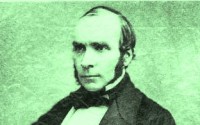John Snow (1813-1858): bicentenary of York’s pioneer of epidemiology and anaesthetics
- Date
- 8 Jan 2013
- Start time
- 7:30 PM
- Venue
- Tempest Anderson Hall
- Speaker
- Dr Stephen Oliver

The Tempest Anderson Lecture
John Snow (1813-1858): bicentenary of York’s pioneer of epidemiology and anaesthetics
Dr Steven Oliver, Senior Lecturer in Population Health, University of York and the Hull York Medical School
Born two hundred years ago, the son of a labourer on the banks of the River Ouse, John Snow went on to become a respected academic physician in Victorian London. He has become an iconic figure in the history of two medical disciplines, anaesthesia and Public Health. He sedated a monarch (and two grizzly bears) and his studies of cholera outbreaks are still used to teach the first principles of studying disease in populations.
Dr Oliver will explore Snows life story, how his scientific work was viewed in his own time and how his posthumous reputation has developed. In addition, Dr Oliver will try to justify why he spent time researching this lecture drinking beer in a pub in Soho.
Report
Steven Oliver gave us an enthralling account of how John Snow born in North Street, the son of a labourer rose to prominence in not just one but two fields of medicine, anaesthesia and public health. Through a family connection, the young John became an apprentice surgeon-apothecary in Newcastle, the first step on the medical ladder. Perhaps because of his experiences in a poor and flood-prone area of York, he was already an advocate of drinking only distilled water: which was perhaps of benefit when cholera reached Newcastle in 1831.
In 1836 he walked to London to attend medical school. Before long, he was well established in the profession, particularly celebrated for his knowledge and practice of anaesthesia, using ether and chloroform. His clinical practice was underpinned by experiments on animals (including frogs, mice and grizzly bears) to establish optimum levels of anaesthetic: this must have been reassuring to his patients, who included Queen Victoria.
He is probably best remembered, however, for his work on cholera. Snow and others established the water-borne nature of the disease by meticulously mapping cholera deaths, in relation to the water supply. Other causes, including social factors and miasmas, were convincingly ruled out. Snows cholera studies are still used as an example of how to study disease in populations. He is remembered both as a founder of the science of epidemiology, and as a proponent of rational medicine.
Peter Hogarth
Further information and links
An article on John Snow is one of many published on this website as part of the YPS “Yorkshire Scientists and Innovators” project.
Go to the John Snow article directly by clicking on this link: https://www.ypsyork.org/resources/yorkshire-scientists-and-innovators/john-snow/
The 200th anniversary of Snows birth on 15th March 2013 is also being marked by the London School of Hygiene & Tropical Medicine with two symposia in March and April 2013. For further information, visit the event website at: http://johnsnowbicentenary.lshtm.ac.uk/